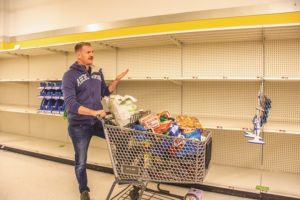Updated at 4 p.m. Tuesday, March 24.
PROVINCETOWN — Outer Cape Health Services will test patients for the coronavirus, but they must first call one of the OCHS health clinics to be screened by phone. If a test is deemed necessary, a staff member will come out to your car in full protective gear to administer it.
“Please call us; don’t walk in,” said Dr. Andrew Jorgensen, OCHS’s chief medical officer.
The region’s major health care provider, Cape Cod Healthcare, which owns the Cape’s two hospitals, is also gearing up for testing and mass treatment of patients suffering from the highly contagious virus. On Monday it began offering drive-through COVID-19 testing at Cape Cod Community College in Barnstable from 8 a.m. to 6 p.m., seven days a week. The effort is a partnership with the Barnstable County Dept. of Health and Environment. People seeking testing there must have a Cape Cod Healthcare doctor’s order for the test — those who do not will be turned away, according to the company’s website.
Concerns about the Cape’s limited hospital capacity are much discussed in the community. Staff at Cape Cod Healthcare would not say what the hospitals’ capacities are or how many ventilators are available on the Cape.
According to the Leapfrog Group, a nonprofit watchdog organization, Cape Cod Hospital has only 24 intensive care unit beds; there are 10 more at Falmouth Hospital.

During the weekly video update on COVID-19 posted on Cape Cod Healthcare’s website on March 12, Dr. David J. Pombo, medical director for infection prevention, said the organization is looking at boarding patients in the hospital and as well as at offsite locations if necessary.
“It’s very hard to predict the future but we’re doing the planning that we can,” Pombo said.
Closer to home, when a concerned patient calls OCHS’s Provincetown, Wellfleet, or Harwich clinics, a nurse will conduct a screening over the phone to determine whether the patient has symptoms consistent with those described by the U.S. Centers for Disease Control and Prevention, including fever, cough, and shortness of breath. Patients will also be asked if they have had contact with a person who has tested positive for COVID-19. The nurse, in consultation with a doctor, will call the state Dept. of Public Health (DPH), which is the gatekeeper for the tests.
Gov. Charlie Baker announced Sunday that doctors could determine if a test is warranted without state laboratory approval, but as of Tuesday, OCHS would not confirm any changes in its clinical protocol.
Scarcity and Anxiety
The screenings and restrictions are necessary because the tests remain in short supply. Dr. Kimberly Mead-Walters of Nauset Family Practice in Orleans said the lack of tests has caused multiple issues, including anxiety.
“Testing is not available, so how can we document contact with COVID-19 patients?” she asked. “That’s been challenging and frustrating.”
Mead-Walters was unable to provide information for her patients who returned from a school trip to Rome just before Italy was declared a coronavirus hot spot in late February.
“They don’t want to be vectors and we could not test them,” she said.
Pat Nadle, the chief executive officer of OCHS, reiterated that patients should not go to the emergency room to get a test. “That will plug up the entire medical care system,” she said. “We are capable of doing that and most doctors’ offices are capable of doing that.”
If the DPH approves a test, the patient will be asked to drive to a clinic and wait inside the vehicle. A staff member will come out and take a nasal swab, which will be sent by courier to a state laboratory outside Boston, Jorgensen said. Results will be reported in two to four days, he said.
OCHS staff are also worried about a nationwide shortage of protective gear. This includes N95 masks, which are needed by medical personnel to protect them from droplets from patients’ sneezing and coughing.
Each day, the state lists the number of confirmed cases of COVID-19 by county at the DPH website. As of 4 p.m. on Tuesday, March 24 there were 40 confirmed cases in Barnstable County.
“Our staff is being educated daily, and we are actively planning for different scenarios,” Jorgensen said.
Store Supplies Depleted
Provincetown was crowded last weekend, as many second-home owners came to the Outer Cape in search of solitude.

William Dunn, who left his Manhattan apartment to “ride out” the pandemic in his Provincetown house, was surprised to find the grocery shelves as empty here as they were in the city. Local stores have been depleted of toilet paper and meat products for several days running; at the Wellfleet Marketplace there is a purchase limit of two per item.
Some who came from the city said they weren’t counting on finding medical care here. Anthony Lee and Keith Vincent, who teach at universities in Boston and New York City, are isolating themselves at their Wellfleet home while they carry on teaching online. If they do become sick, Vincent said, they will drive back to Boston for the city’s more robust health care options, an idea that was echoed widely.
The hope is to avoid infection in the first place. To accomplish that, a plan to isolate oneself is crucial. Epidemiology experts estimate that the majority of people in New York City have already been exposed to the virus (see separate story, Answers About the Virus From Medical Experts).



